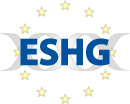ESHG pre-meeting courses – Registration is now open
With the upcoming 2023 meeting, the ESHG Education Committee plans to start with a series of so-called “pre-meeting courses”. Education has a prominent place at the annual ESHG meetings. The program of the annual meeting has specific educational sessions and workshops, which give participants the opportunity to learn about the latest developments in the field of human genetics. However, this education tends to focus on the high end of developments, there seem to be less opportunities for participants seeking more basic education and training. The pre-meeting courses plan to fill this gap, i.e. offer on-site education and training in the more basic subjects in human genetics.
The ESHG Education Committee would like to know which subjects you would like to get covered during the pre-meeting courses. Please send wishes, suggestions etc. to office@eshg.org
For 2023 two topics have been planned. Introductory lectures covering the basis of the subjects, will be followed by tasks where the participants will directly apply what was learned by trying to solve practical examples.
ESHG Course: HGVS nomenclature – CANCELLED
ESHG Course: ACMG-AMP classification system (In-person Only)
Registration is now closed
Friday, June 9, 2023 at the Crowne Plaza Hotel Glasgow in Room Staffa
Course fees:
Regular: EUR 100
Trainees: EUR 50
ESHG Course: Clinical NGS Data Interpretation Course (In-person Only)
Registration is now closed
Thursday June 8 and Friday June 9 at the Crowne Plaza Hotel Glasgow in room Barra
Considerations:
- Focus on the clinical interpretation of variants, only basics of sequencing technologies, not the analysis, not ELSI issues
- Practical course with an emphasis on people working with real data and cases
- Focus on WES data. This is most used, has most cases and data, and is in important ways similar to WGS
Learning goals:
- How to interpret SNVs from WES data
- How to interpret CNVs from WES data
- What practical tools/databases for WES interpretation are freely available
Number of participants: 35 people maximum
Course instructors:
- Christian Gilissen, bioinformatician, expert in WES analysis
- Rolph Pfundt, clinical molecular geneticist, expert in cytogenetics of WES
- Erik-Jan Kamsteeg, clinical molecular geneticist, expert in molecular genetics of WES
- Anne-Sophie Denommé-Pichon: clinical geneticist, expert in WES
The Clinal NGS Data Interpretation Course, has been accredited by the European Accreditation Council for Continuing Medical Education (EACCME®) with 12 European CME credits (ECMEC®s). Each medical specialist should claim only those hours of credit that he/she actually spent in the educational activity. Through an agreement between the Union Européenne des Médecins Spécialistes and the American Medical Association, physicians may convert EACCME® credits to an equivalent number of AMA PRA Category 1 CreditsTM. Information on the process to convert EACCME® credit to AMA credit can be found at www.ama-assn.org/education/earn-credit-participation-international-activities.
Live educational activities, occurring outside of Canada, recognised by the UEMS-EACCME® for ECMEC®s are deemed to be Accredited Group Learning Activities (Section 1) as defined by the Maintenance of Certification Program of the Royal College of Physicians and Surgeons of Canada.
Course fees:
Regular: EUR 100
Pre-conference meeting: International Cerebral Palsy Consortium
Friday, June 9, 2023, 13:00-17:00 hrs (BST) at the Scottish Event Campus, Glasgow, Room: Alsh 1
In this workshop, members of the International Cerebral Palsy Genomics Consortium (ICPGC) will introduce and discuss the latest advances in the genomics of Cerebral Palsies (CP). CP is a clinically heterogenous neurodevelopmental disorder that causes lifelong impairment of movement and posture. Previously, CP was commonly attributed to various environmental factors, although the specific cause for most individuals was unknown. Genetic studies using whole exome or whole genome sequencing have shown that at least 30% of individuals with CP have a clinically relevant genetic diagnosis.
Course fees:
Free of charge


